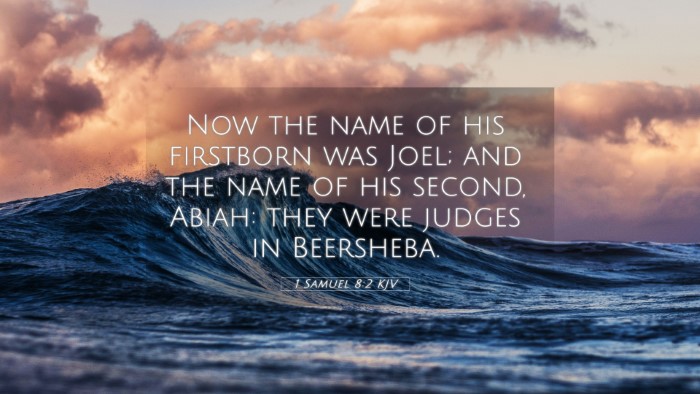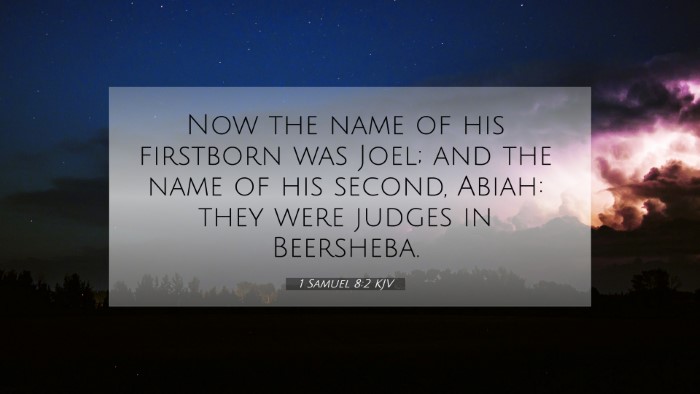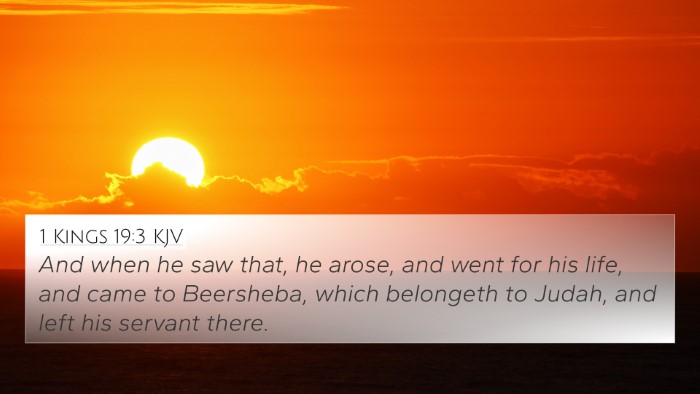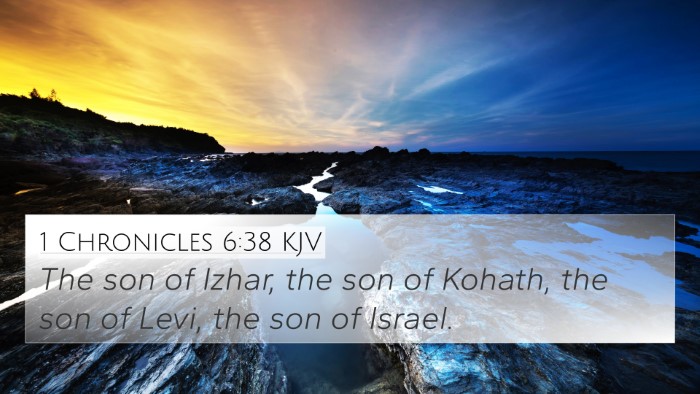Understanding 1 Samuel 8:2
Verse: 1 Samuel 8:2 - "And the name of his firstborn was Joel; and the name of his second, Abiah: they were judges in Beer-sheba."
Summary of 1 Samuel 8:2
This verse introduces the sons of Samuel, Joel and Abiah, who were appointed as judges in Beer-sheba. The context indicates a transition in Israel from judges to a monarchy.
Commentary Insights
- Matthew Henry: Henry highlights that Samuel's attempt to pass leadership to his sons was met with failure, contrasting the righteous leadership of Samuel with the unjust behavior of his sons. Henry emphasizes the importance of personal integrity in leadership.
- Albert Barnes: Barnes remarks on the significance of the names Joel and Abiah, interpreting them as “Jehovah is God” and “Jehovah is my Father.” He reflects on how these names underscore the parental and spiritual responsibility entrusted to Samuel in raising his sons. He also notes that the appointment of these judges reflects the decentralization of power during Samuel’s time.
- Adam Clarke: Clarke provides a deeper analysis of the historical context in which Samuel's sons operated. He points out the challenges they faced, including their failure to emulate Samuel's righteous rule, which led to the people's desire for a king. Clarke also notes the geographical significance of Beer-sheba as an influential city in Israel.
Key Themes Explored
1 Samuel 8:2 encapsulates several critical themes within the larger narrative of Scripture:
- Leadership and Accountability: The verse serves as a reminder of the moral responsibility of leaders and their influence over the people they govern.
- Legacy of Leadership: Samuel's legacy is put to the test, raising questions about the effectiveness of his leadership and the direction of the nation.
- Transition of Power: The children of Israel's cry for a king marks a significant shift from theocratic to monarchical rule, a theme that is explored in the subsequent chapters.
- Judgment and Justice: The failure of Joel and Abiah to judge righteously leads the people to seek governance that adheres to their desires rather than divine principles.
- Divine Sovereignty: The verse implies God's sovereignty even amid human choices and failures, guiding the eventual establishment of monarchy in Israel.
Cross-References for 1 Samuel 8:2
This verse has several related passages that enhance understanding through cross-referencing biblical texts:
- 1 Samuel 2:12: Description of Eli's sons’ corrupt behavior, highlighting family failure in spiritual leadership.
- Deuteronomy 16:18: Establishes the necessity of appointing judges to maintain justice within Israel.
- 1 Samuel 3:1: Discusses the rare word of the Lord at the time, providing context to Samuel's role as a prophet and judge.
- 1 Samuel 12:1-5: Samuel's farewell address, where he reflects on his leadership and the people's request for a king.
- Jeremiah 2:8: A discussion on prophets and the moral decay of the priesthood that parallels Samuel's narrative.
- Hebrews 11:32: Mentions Samuel among the faith heroes, affirming his significance in biblical history.
- 2 Chronicles 19:5-7: Instructions for just judgment, resonating with the expectations of Samuel's sons as judges.
Tools for Understanding Bible Cross-References
Engaging with cross-references and thematic connections can enrich one's study of the Bible:
- Bible Concordance: Useful for finding specific verses and their occurrences throughout Scripture.
- Cross-Reference Bible Study Tools: Various Bibles include cross-references in the margins, allowing for easy navigation between related scriptures.
- Comprehensive Bible Reference Resources: Various publications provide detailed studies and thematic connections between verses.
- Bible Chain References: A method of connecting verses thematically for deeper study.
Conclusion
1 Samuel 8:2 serves as a crucial passage reflecting the dynamics of leadership and divine sovereignty in Israel. The lessons derived from this text are not only relevant for biblical understanding but serve as practical insights into the nature of leadership, responsibility, and the broader narrative of God’s unfolding plan with His people. In cross-referencing this verse with others, one can identify connections that reveal the consistent themes and lessons woven throughout the Bible.







